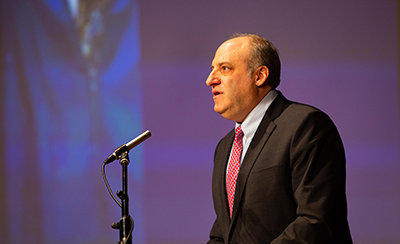
Dec 9, 2019 | Meghan Durkin, School News
By Rhea Kapur (V)
On Friday, November 8, at the annual John Hanly Lecture on Ethics and Morality, Mr. Andrew Goldstein ‘92 discussed the influence of the Honor Code in his career at Pingry and beyond, and shared some ethical dilemmas he faced where the Honor Code’s principles guided him.
Established in 1999, the John Hanly Lecture Series on Ethics and Morality honors former Headmaster John Hanly’s personal commitment to instilling honorable and ethical values in students at Pingry. A diverse set of speakers have visited campus each year since the series’ inception, each of them having a unique viewpoint on ethics and moral dilemmas in the 21st century. Mr. Goldstein is no exception. After graduating from Princeton University in 1996, Mr. Goldstein returned to Pingry to teach AP Government and World Cultures, filling the role of his former teacher Mr. Joe LaValley (whom Mr. Goldstein greatly admired). Later, Mr. Goldstein joined TIME Magazine as an investigative reporter. After graduating from Yale Law School, he eventually served as Chief of the Public Corruption Unit at the U.S. Attorney’s Office for the Southern District of New York. Recently, he was Senior Assistant Special Counsel in the Department of Justice’s Russia investigation, led by Robert S. Mueller III.
In his remarks, Mr. Goldstein shared two stories, one of which centered around his experience as an investigative reporter at TIME. While covering the Columbine High School shooting, Mr. Goldstein discovered that members of the school’s community were distraught from TIME’s recent cover photo, in which the main focus was on the shooters, not the students who were killed. They wanted reassurance that this would not happen again. Mr. Goldstein retained a neutral position, noting his lack of control over the matter, but also stated how he could not believe they would repeat such a thing.
When another cover story that focused solely on new video footage of the killers ran, Mr. Goldstein had to come to terms with the betrayal the members of the community would feel and the role he played in that betrayal. To alleviate some of the pain, Mr. Goldstein personally reached out to each person he talked to, warning them ahead of time of the cover story. He also contemplated whether he “could have pushed harder [than he did] to keep that photo off the cover,” acknowledging his personal responsibility. Mr. Goldstein’s main takeaway from this was to figure out one’s motivations – the principles upon which one bases their decisions. Getting those right, he noted, is the first step towards acting with integrity. This was a key theme of his overall talk. In his conclusion, he reminded students and faculty to “step back and look at our public discourse today… the importance of telling the truth has dropped off the list of what people think matters. As Pingry students, that should not be acceptable to you.” He encouraged the community to always “remember the values [that] were taught here” to guide their decisions in life.
The talk was well received throughout the community. Meghan Durkin (V), Secretary of the Honor Board, said that “his take on the Honor Code was very insightful, especially his remark that while it may allow for more violations, it provides students with the chance to make realistic, tough decisions.” Samantha Burak (VI) also noted how “we hear about honorable behavior in our daily lives, but this was an important reminder that the lessons of the Honor Code apply well beyond just high school. The stories that Mr. Goldstein shared with us revealed that real situations in life are not always black or white, but that we should be striving to act with personal integrity regardless.”
Oct 18, 2019 | Editorial, Meghan Durkin, Opinion
By Meghan Durkin (V)
My brother joined me outside, football in hand. The fall wind brushed past our faces as it carried the ball from his hands to mine and back. Our hands grew colder with each toss until we ran inside for warmth. It was the first time we had thrown the football together in years. When we were younger, it was a weekly ritual, and one that brought us sweet memories. Five years later, standing in my backyard as the football flew through the chilling air, I felt the desire to reverse time. I wanted more than to be reminded of what we used to do; I wanted to be back in that time. I wished for my carefree, strong self; I needed my brother to have time to spend with me again.
I felt nostalgic. The feeling was overwhelmingly bittersweet. I envied my former self. The nostalgia consumed me. But I know I’m surely not alone in this feeling. Society has come to seek nostalgia more frequently. The feeling has shaped our media, trends, and fashion. Nostalgia, often a relatively personal feeling, has become global. The connectivity of our world, which has only recently expanded, forces commonalities in experiences that trigger nostalgia. With the rise of technology and social media, we have a greater access to shared thoughts and events, which ultimately allows nostalgia to shape our world as an image of the past.
This newfound sense of global nostalgia is evident in recent fashion trends: platform shoes from the seventies, scrunchies from the eighties, and the denim-on-denim look from the nineties. The popularity of these trends has resurfaced decades later to blend into today’s fashion. While acting as reminders of the past, they serve as evidence of the desire to return to and pull from what was. Nostalgia is also fueling the entertainment industry. In the last six months, Disney has released three live action remakes of their classic films, including Aladdin and The Lion King, which, combined, made over two billion dollars at the box office. These movies attracted people who had watched them as kids, capitalizing on the need for nostalgia. The films allow them to relive a simpler, often more desirable, time in their lives. Furthermore, both the resurfacing of fashion trends and classic movies stress the worldwide nature of nostalgia. It is felt universally by a generation. As distant places and people are connected through technology, that shared nostalgia is more accessible and society is reaching for it.
The accessibility of nostalgia is present in the popularity of Netflix. With the click of a button, people can watch shows and movies from decades ago. These shows, including Friends and The Office, are not only watched by original fans, but by a new generation who wishes to be included in the shows and the collective experience they create. Along with this, the Netflix revivals of shows such as Gilmore Girls and Arrested Development give viewers a greater entrance into the past as it seemingly takes them, in a new way, back to the first time they saw the show. For original viewers, this type of access to their favorite show has only been made possible recently.
While nostalgia allows fond times and experiences in our lives to resurface, it can be dangerous. Nostalgia acts as another form of regret, a form that is often sheltered from the negative connotations. The feeling stops us from letting go; it stops us from being satisfied. With expanding technology and connection, nostalgia is no longer as simple as reminiscing over tossing the football in the backyard; it is a way to expose the discontent with society in the present. People wish to go back to a time in which they believe the world was better off. The rise of global nostalgia signifies a collective need to remove ourselves from the present, and reminisce about the simpler times of our past.
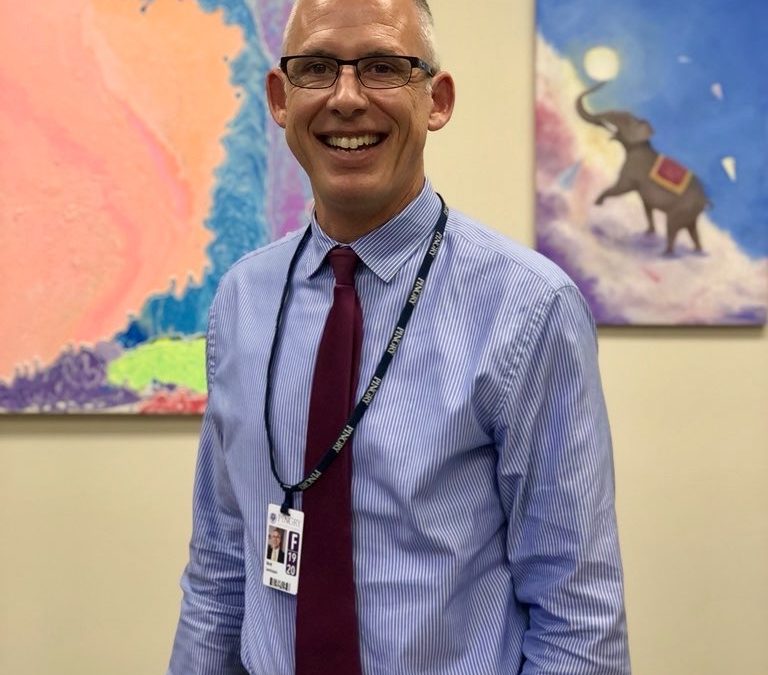
Oct 18, 2019 | Eva Schiller, Faculty + Staff, Featured, Meghan Durkin, School News
Eva Schiller (V), Vicky Gu (VI), Meghan Durkin (V)
Though the Pingry community has known his name for almost a year now, Mr. Matt Levinson has just begun his first academic year as our new Head of School. Following a five-month search and a unanimous vote from the Board of Trustees, Pingry officially welcomed its sixteenth Head of School on July 1, 2019, succeeding Mr. Nathaniel Conard’s 14-year tenure as Headmaster.
The role of the Head of School has long been ambiguous to many Pingry students. Mr. Levinson explains his job as keeping “everybody focused on the student experience… from myself, to all administration, staff, and teachers,” and that “every day is different. There are a lot of interesting challenges that cross my desk, problems to solve.” He remarked, “But also, being out in the community, being out in classes, being out at games, is really important.”
When asked what drew him to Pingry, Mr. Levinson immediately responded, “the Honor Code was a first appeal… The trust that’s inherent in having an Honor Code is really meaningful to me.” Pingry’s inclusive atmosphere was also attractive. “Commitment to diversity and inclusion is really important to me, personally and professionally,” he says, adding, “I’ve been really struck and impressed by Pingry’s diversity and how it strengthens and enriches the community.”
Beginning his career teaching both middle and high school students, Mr. Levinson has stepped into many roles within school communities, whether that be coaching sports or serving as a dean of students. He believes that his experience allows him to “understand everything that goes into running a big organization like Pingry.”
Despite his extensive experience with education, he confessed that in high school, he was not always “as engaged as [he] should’ve or could have been, but something just kind of kicked in senior year and a couple teachers really inspired [him].” During his time at Pingry so far, he has noticed “how much [the teachers] are inspiring to you all.”
When asked about his vision for Pingry, Mr. Levinson left his response open-ended. Rather than only him deciding where Pingry should go in the upcoming years, he thinks that everyone should have input and “that the vision question is something we all need to invest in and work on together.” However, he does have a “strategic plan focusing on global education, student wellbeing, interdisciplinary learning… and also to promote teacher growth and development.”
His first step is to address student wellbeing with the hopes of helping the community “improve and be attentive.” So far, he has met with peer leaders and teachers, and plans to do some staff training in November.
Speaking on the Pingry community, Mr. Levinson noted that “everyone’s been incredibly welcoming, which has been wonderful.” He has visited classes on both campuses and gone to games in order “to get the chance to see the student experience.” What amazed him since his arrival was the “long history of people who invest their lives here. I think everyone here is trying to always get better, no one’s standing still, which I love about the community”.
Mr. Levinson also revealed that the process for getting “Shorts Days” begins with students. A student emailed him one evening asking to allow shorts the next day, and by the end of the night, Mr. Levinson had confirmed one. “I know,” he says, “on a hot day, when there’s no air conditioning, it’s nice to be able to wear shorts.”
Speaking of air conditioning, will Pingry ever get it? “That’s a big question I’m hearing; lots of people want to talk about that, but I don’t have an answer to that yet. It could happen. I don’t know when, but I know it’s something that people, especially in the 90-degree weather, are very interested in.” Perhaps someday.
Mr. Levison concluded, “I would just like to say I’ve been so impressed with the students in this school. The engagement in the classes that I’ve seen, from kindergarten all the way through 12th grade, makes it clear that the kids here really like learning and want to learn, and the teachers are really invested in making that happen.”
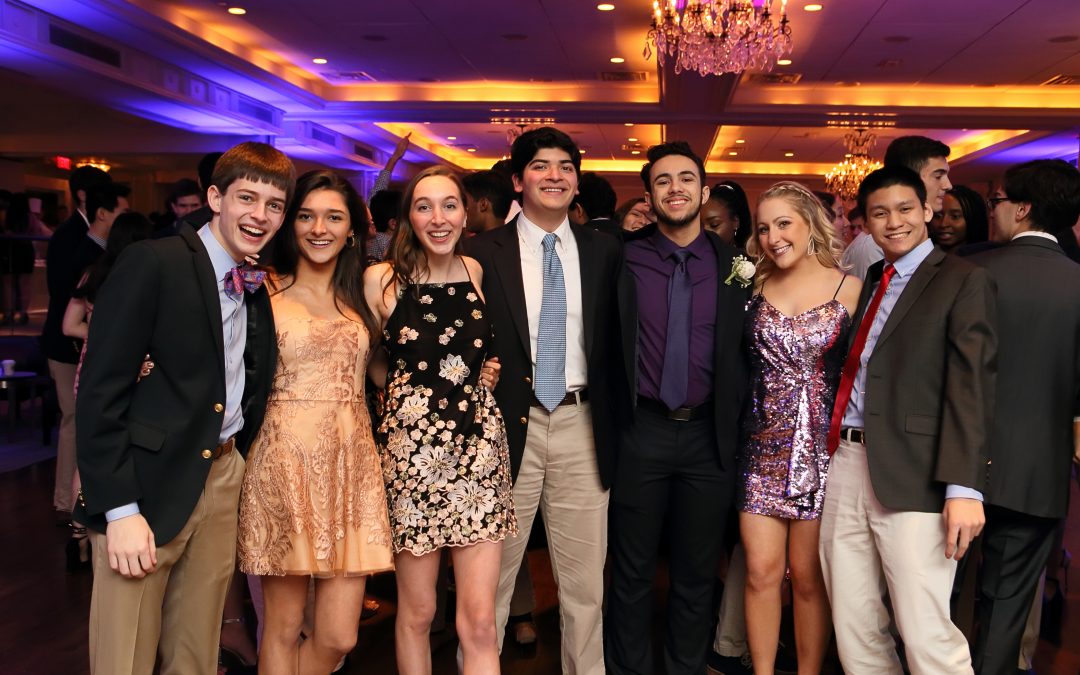
Mar 24, 2019 | Meghan Durkin, School News
By Meghan Durkin ’21
On Saturday, January 26, students arrived at The Westin Governor Morris in Morristown, NJ for Pingry’s annual winter dance, Snowball. Snowball is a “Sadie Hawkins”-style dance, in which girls traditionally ask boys to attend the dance with them. Students, dressed in formal attire, filled the hotel for a night of dancing, music, and friendship.
Last year, The Westin served as the location for Snowball for the first time. The venue turned out to be a terrific space, with a large dance floor, spacious lobby, and plenty of dining tables for students. Because it was so well-received by the community, Student Government decided to hold the dance at The Westin again. Upon arrival, students entered a main lobby where they could check their coats and bags. Up a flight of stairs, there was a buffet along with soft drinks and a dance floor.
The food choices were a highlight of the event, including macaroni and cheese, dumplings, and burgers. Student Body President Andrew Cowen (VI) agreed that “the food was great.” Along with the food, students could take pictures in the photo booth with props, while the event as a whole was photographed by Peter Chollick Photography. Helen Baeck-Hubloux (V) said, “I found the photo booth to be a very good experience for bonding.”
This year, music included both popular songs, like Cardi B’s “Bodak Yellow,” and old favorites, like “Come on Eileen” by Dexy’s Midnight Runners and Neil Diamond’s “Sweet Caroline”. Many students crowded the dance floor throughout the night, including Baeck-Hubloux, who added, “[I] had a wonderful time dancing with friends.”
Students agreed that Snowball served as a great opportunity to connect with classmates. Maile Winterbottom (IV) said that it is a “good time for the school to get together as a community and everyone to just bond over something super cool and fun and to get dressed up.”
Sydney Stovall (IV) said, “Snowball is a great time to get with friends and meet new people. You are all dressed up, so it’s a really fun atmosphere. Of course, it’s a good time to release some stress.” Snowball, once again, provided a time for the student body to come together with dancing, music, and food.
Jan 16, 2019 | Athletics, Meghan Durkin
By Meghan Durkin ’21
As the winter season begins, the ski racing team, led by captains Annie Leithead (VI), Brian Kaplan (VI), Matt Dispenza (V), and Rosemary Collins (IV), looks to build on last year’s strong performance. Last winter, Leithead, Dispenza, and Collins all qualified individually for the Race of Champions, in which they finished 15th, 13th, and 3rd, respectively. Collins and Dispenza also went on to become the first Pingry skiers to compete at the Eastern High School Alpine Championships.
This year, the team is thrilled to get back on the slopes. The team hopes the “girl’s team will do better at States and the boy’s team will qualify,” according to Collins. She and the other captains believe “that’s a very achievable goal if we work hard.”
Leithead and the rest of the team are “happy the weather finally cooled down and are hopeful for a cold and snowy winter. We are really excited to see how we perform and ready to get on snow and see some new talent.”
Nov 22, 2018 | Meghan Durkin, School News
By Meghan Durkin ’21
On October 26, both Upper and Middle School students participated in Pingry’s annual Rufus Gunther Day. In a day dedicated to community service, Pingry students and faculty visited numerous organizations in order to give back to the greater New Jersey community. Students continued the long-standing tradition of service by, among other activities, sculpting clay, making blankets, planting trees, decorating posters, and sorting candy.
In the morning, buses picked students up and dropped them off at their various organizations. This list included Grow It Green, an organization that uses gardens to help provide fresh food to the community; Deirdre’s House, a center for children affected by abuse; and Community FoodBank, which helps the hungry. Pingry students also worked with ECLC (Education, Careers, and Lifelong Community), the John Taylor Babbitt Foundation, and Bridges Outreach, all of which Pingry has built strong relationships with.
In addition, students helped at organizations created by Pingry alumni: Saint Justine’s Preschool and The Christopher and Dana Reeve Foundation. A Birthday Wish, founded by another Pingry alum, provides gifts for kids in the foster care system. Anushka Agraway (IV), who helped wrap presents for the organization, remarked about her experience: “It was really great because it gives us a fun way to give back to the community”.
For the second time, Pingry Drama students went to Montgomery Academy, a school for kids with social and educational challenges. There, they stayed with Montgomery students during classes, including Music and English, and played improvisational games with them to help them learn how to mend negative situations. Mr. Alan Van Antwerp, a Drama teacher who joined the Pingry students at Montgomery, was excited to see that the Montgomery students “got along well with the Pingry students because they saw that [they] all were students too” and that there was a “fun, collaborative” environment between the two groups.
Ms. Shelley Hartz, Director of Community Service, worked hard to put the day together and finds that it’s important to “recognize as a community that we are part of a community . . . part of many communities” and that Rufus Gunther Day is an opportunity to “work with so many organizations that are diverse in what they do.” Ultimately, she hopes that this day of community service “builds bonds and tradition for students.” Ms. Hartz’s dedication to building relationships with organizations, in conjunction with Pingry students’ active involvement in community service, made Rufus Gunther Day, once again, a uniquely rewarding day.
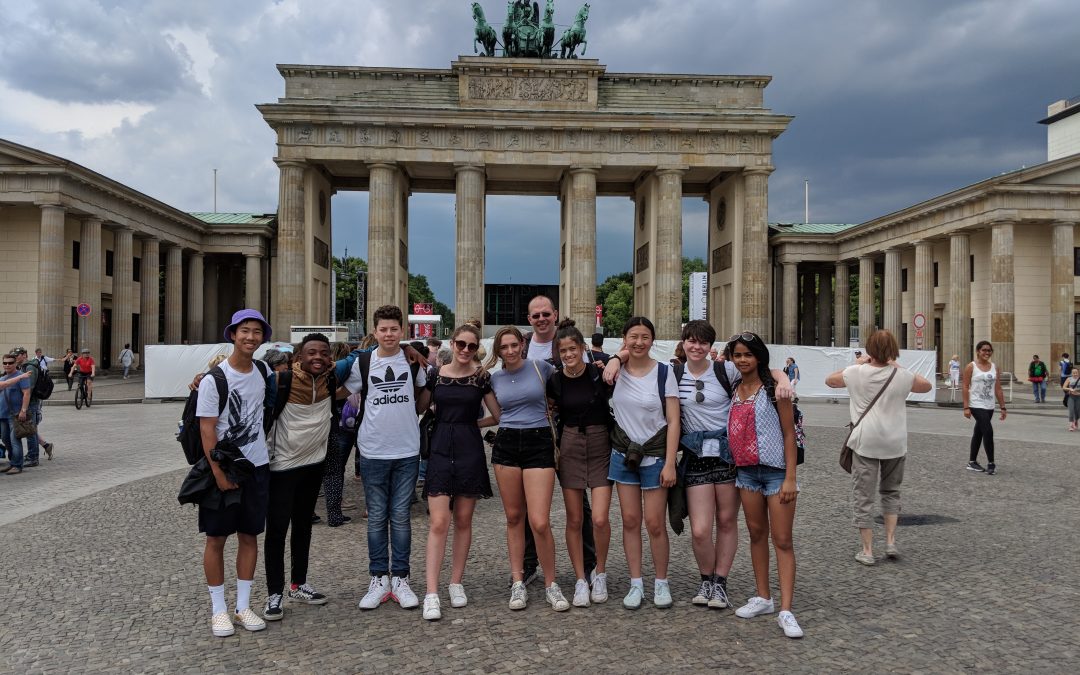
Nov 17, 2018 | Meghan Durkin, School News
By Meghan Durkin ’21
Over the summer, groups of Pingry students traveled to Peru, Belize, Croatia, Bosnia, and Germany to learn about and explore these countries’ cultures outside of the classroom. Whether by meeting locals, visiting cultural sites, or exploring the sea, these travelers immersed themselves in their research. This year, for the first time, students received academic credit for their learning abroad.
Students in Belize spent most of their time exploring coral reefs in order to research how changing environmental factors have affected the reefs and the aquatic life that surrounds them. Between snorkeling and collecting data, the group worked to compile their research for a final project.
In Germany, another group traveled to discover the differences between how Germany handles immigration and the Syrian refugee crisis compared to the United States. Students immersed themselves in German culture during homestays, visited Berlin, and spent time at a local German school. Zara Jacob (IV), reflecting on her experience throughout her time in Germany, explained that she learned, “America is not the center of the world.”
In Peru, students investigated the work of nonprofit organizations and their missions of sustainability while visiting Lima, Uratari, and Machu Picchu. Working with the Denan Project, a nonprofit that assists isolated communities in countries like Peru, Ethiopia, and Mongolia, students examined these organizations while enjoying a parade in their honor, an invitation to the Peruvian Congress, and homestays.
While in Croatia and Bosnia and Herzegovina, another group of students talked with locals and explored cities to learn more about nationalism and national identity in the Balkans. Within the Croatian cities of Zagreb and Dubrovnik and Bosnian cities of Sarajevo and Mostar, they investigated the impact of the countries’ history on their state today.
Mr. Jewett, the Director of Global Education, led the cause in allowing academic credit to be given to the trip-goers in order to “increase the curricular connection between off-campus programs and on-campus ones.” He wishes to offer students “a good chance to reflect on something they learned.” Along with the academic goal of each individual trip, Mr. Jewett strongly emphasized the critical life skills that develop while students are abroad. In addition to independence, travelers “build empathy, recognizing that other people in the world have perspectives about the world that are different than yours”.
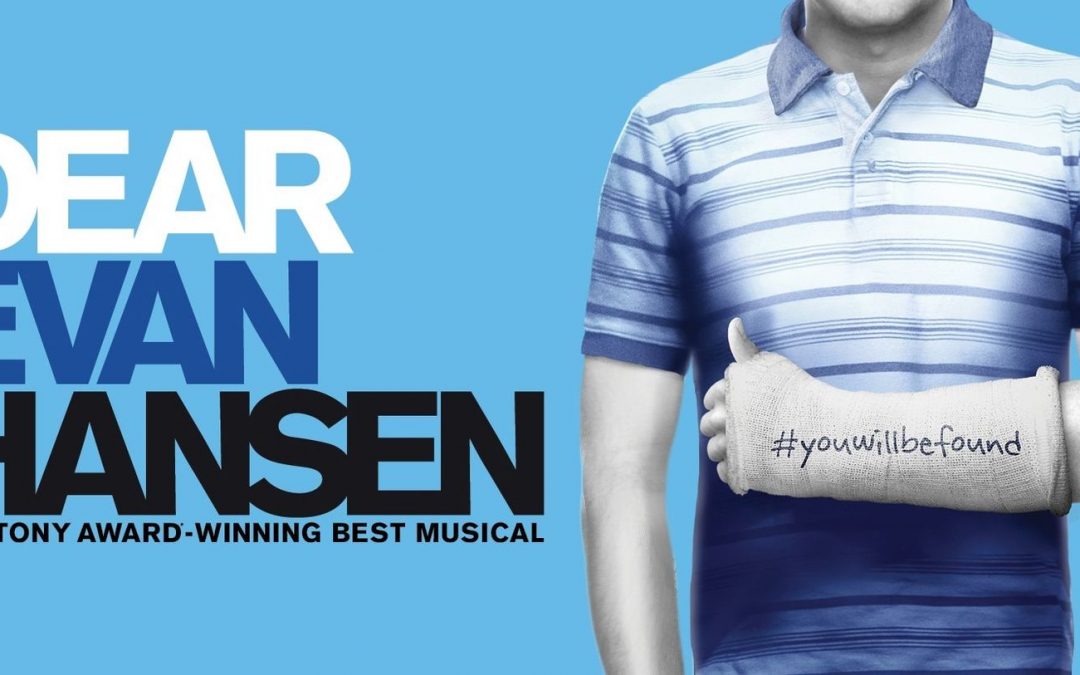
Nov 13, 2018 | Featured, Meghan Durkin, Movies, School News, School Trips
By Zara Jacob ’21
The class of 2021 eased into their sophomore year with a trip to New York City, exploring exhibits in the Museum of Natural History and and seeing the Tony Award-winning “Best Musical,” Dear Evan Hansen.
With not a single textbook or laptop in hand, the grade split up onto four buses and headed on a 90-minute ride to the city. After reaching the museum, they were divided by advisories, perusing the various exhibits at the museum. Unlike previous years, when a scavenger hunt was assigned, the students had the freedom to pick which exhibits they wanted to visit with their advisories. Many of the students appreciated this change; Meghan Durkin (IV) explained, “I enjoyed the museum more than I anticipated because I got to see exhibits that I thought were interesting, as opposed to a plan created by our advisors.” From fossils to dioramas filled with cavemen, the first segment of the trip maintained a good balance of fun and education.
After eating lunch in the museum, the students made their way back to the buses and headed to the theater. Despite a slight accidental detour, all 150 sophomores eventually made it to the correct theater, where they watched the 2 o’clock showing of Dear Evan Hansen. As the students crowded up the stairs, many stopped for snacks, waiting anxiously for the musical to begin.
Dear Evan Hansen tackles themes of bullying, loneliness, and suicide — daunting topics that many teenagers face today. Sanjana Biswas (IV) said, “The musical was relevant to the modern times we live in, and the portrayal of social media and its platform was very accurate.”
The musical begins with showing two teenage boys who struggle with depression and anxiety. Evan, the protagonist of the musical, desperately seeks to step out of the shadows and be noticed. We see Evan’s yearning for true care and appreciation through the passionate performance of his song, “Waving Through a Window.” His mother, juggling school and work, struggles to be there for Evan, and his therapist suggests he write letters to himself to help his self-confidence (hence the name Dear Evan Hansen). The other teenage boy, Connor Murphy, is briefly introduced to the audience before committing suicide.
Through a series of unfortunate events, one of Evan’s letters to himself, which discusses his troubling thoughts and anxieties, is with Connor on the day he commits suicide, and is misconstrued as Connor’s last words being addressed to Evan. Stuck in an impossible situation, Evan hopes for everything to blow over, but ends up meeting with Connor’s family almost every day and pretends to have known Connor as a best friend. All of Evan’s dreams begin to come true – he lands the girl of his dreams, feels the warmth of a loving, present family, and becomes famous on social media. To know how Evan fares throughout the rest of the musical, you will have to go and see it. From the actors to the captivating music, it is no wonder that Dear Evan Hansen has won so many awards.
After the show, the sophomores headed back to Pingry, their first day of school having come to an end.
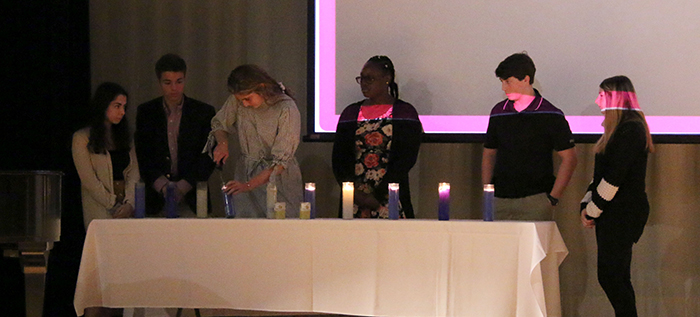
Jun 10, 2018 | Meghan Durkin, School News
By Meghan Durkin ’21
On April 13, Pingry’s annual Holocaust Assembly brought to life critical issues of the past and their relevance in society today. Actor Marc Spiegel performed a one-man play entitled Time Capsule in a Milk Can. In 2003, the United States Holocaust Memorial Museum produced the play to commemorate the the museum’s tenth year since opening.
The play follows the story of Emanuel Ringelblum, an activist and Jewish man living in the Warsaw Ghetto during the Jewish community’s genocide in Germany. He, along with fellow Jews, recognized the importance of the preservation of their words, accounts, and documents during the systematic killing of millions of Jews.
Throughout the play, Ringelblum sat at his dimly lit desk, collecting and formulating a plan to ensure the safety of the historical documents he gathered during his time in Warsaw. Ultimately, he and his fellow activists decided milk cans were the optimal method of storing and hiding the documents due to their ordinary, unassuming nature. During each phase of the plan, students were asked to read parts of the different documents, making the play a truly interactive experience.
After the performance, students lit 12 candles, representing the six million Jews killed, along with five million others in Europe who fell victim to the violent hatred. Alexandra Weber (IV), one of the students who participated in the assembly, appreciated how the play “was able to find a great balance between making the assembly educational while also making it personal and sentimental.” She believes “it is a humbling reminder of how lucky we are to live in the world that we live in today. Hearing stories of people’s courage, bravery, and perseverance through such a difficult time always inspires me and, I hope, the rest of the Pingry community.”
As the faculty member overseeing the coordination of the Holocaust Assembly, Director of Community Service Mrs. Shelley Hartz chose this play because she wanted an “interactive, more personal and real” way to remind the community what happens “when people hate and people are afraid.” Ultimately, her goal was “to have conversations after and delve into how and why it is relevant today, insuring genocides don’t occur.”






